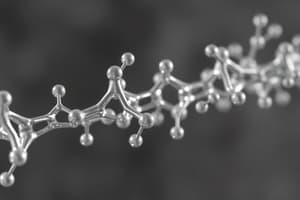Podcast
Questions and Answers
What are biomolecules?
What are biomolecules?
- Non-carbon containing molecules.
- All molecules.
- Molecules synthesized by living organisms that contain carbon atoms. (correct)
- Only carbohydrates.
What is the chemical formula representation of carbohydrates?
What is the chemical formula representation of carbohydrates?
C(H2O)N
What are monosaccharides?
What are monosaccharides?
Simple sugars composed of a single unit.
What is the formula for glucose?
What is the formula for glucose?
What two monosaccharides form sucrose?
What two monosaccharides form sucrose?
What are polysaccharides?
What are polysaccharides?
Where is glycogen found?
Where is glycogen found?
What is starch used for?
What is starch used for?
Humans can digest cellulose.
Humans can digest cellulose.
What are lipids primarily composed of?
What are lipids primarily composed of?
What does amphipathic mean?
What does amphipathic mean?
Flashcards
Biomolecule definition
Biomolecule definition
Molecule made by living things, containing carbon.
Carbohydrate formula
Carbohydrate formula
Generally represented as C(H₂O)ₙ
Monosaccharide
Monosaccharide
Simple sugar, single unit.
Glucose formula
Glucose formula
Signup and view all the flashcards
Sucrose components
Sucrose components
Signup and view all the flashcards
Polysaccharide
Polysaccharide
Signup and view all the flashcards
Glycogen location
Glycogen location
Signup and view all the flashcards
Starch use
Starch use
Signup and view all the flashcards
Cellulose digestion
Cellulose digestion
Signup and view all the flashcards
Lipid components
Lipid components
Signup and view all the flashcards
Amphipathic definition
Amphipathic definition
Signup and view all the flashcards
Study Notes
Biomolecules
- Molecules synthesized by living organisms containing carbon atoms.
- Other essential elements include oxygen (O), hydrogen (H), and nitrogen (N).
- Four common types: carbohydrates, lipids, proteins, and nucleotides.
Carbohydrates
- Organic compounds with the ratio of carbon, hydrogen, and oxygen as 1:2:1 (C(H2O)N).
- Composed of multiple hydroxyl groups, making them polar and water-soluble.
- Major groups: monosaccharides, disaccharides, and polysaccharides.
Monosaccharides
- Simple sugars consisting of a single unit.
- Common examples: glucose, fructose, and galactose.
Glucose
- A crucial source of cellular energy.
- Chemical formula: C6H12O6.
Disaccharides
- Formed by the covalent bonding of two monosaccharides.
- Examples:
- Glucose + Fructose = Sucrose
- Galactose + Fructose = Lactose
Polysaccharides
- Carbohydrates created through the covalent bonding of multiple monosaccharides.
- Examples include glycogen, starch, and cellulose.
Glycogen
- A polymer made of glucose subunits found in animal cells.
- Allow cells to store glucose for later energy needs.
Starch
- A polysaccharide primarily found in plants.
- Digested by humans, providing glucose subunits as energy sources.
Cellulose
- A polysaccharide present in plants that humans consume but cannot digest.
- Known as dietary fiber, it passes through the gastrointestinal system undigested.
Lipids
- A diverse group of biomolecules mainly composed of carbon and hydrogen atoms linked by non-polar covalent bonds.
- Some may contain oxygen and phosphates, depending on structure; can have polar regions.
- Examples: triglycerides, phospholipids, eicosanoids, and steroids.
Amphipathic
- Molecules with both polar ("water-loving") and non-polar ("water-hating") ends.
- Facilitate interaction between polar and nonpolar molecules.
- Characteristic of detergents and phospholipid molecules in cell membranes.
Studying That Suits You
Use AI to generate personalized quizzes and flashcards to suit your learning preferences.




